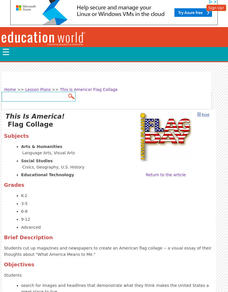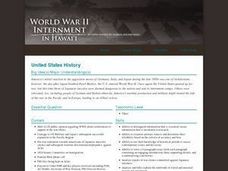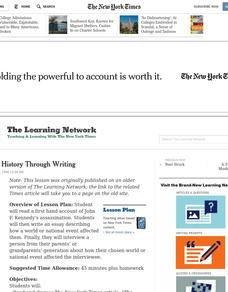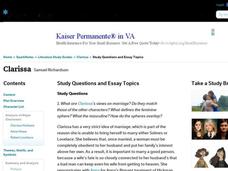PBS
Evolution of the Presidency: Theodore Roosevelt to Franklin D. Roosevelt
How much power should a president be allowed to exert? Theodore Roosevelt and Franklin D. Roosevelt exercised their power according to their interpretations of the United States Constitution, and these interpretations affected the...
Curated OER
This Is America! Flag Collage
In a visual essay of their thoughts about "What America Means to Me," kids of any age can create a collage about their country. Originally intended to be created physically, learners could share their projects online by using an...
Smithsonian Institution
Art to Zoo: Life in the Promised Land: African-American Migrants in Northern Cities, 1916-1940
This is a fantastic resource designed for learners to envision what it was like for the three million African-Americans who migrated to urban industrial centers of the northern United States between 1910 and 1940. After reading a...
Digital Public Library of America
Teaching Guide: Exploring To Kill a Mockingbird
Harper Lee's To Kill a Mockingbird, considered by many to be a seminal piece of American literature, contains many complex literary themes that carry through United States history. Use a series of discussion questions and classroom...
Mr. Nussbaum
THE Founding Father
Who is the founding father—George Washington, Thomas Jefferson, or Benjamin Franklin? Scholars decide which of three early Americans, should be crowned the founding father of America based on research. Then, they compose a persuasive...
Curated OER
Looking at Human Struggle Through The Language Arts Curriculum: The Faces of Slavery
Sixth graders examine the use of slavery in the United States. Using a map, they draw the route of the Tecora and Amistad voyages. Individually, they write an essay describing their opinions on whether the Africans on the ships should be...
Constitutional Rights Foundation
Women in the Military
Scholars analyze the role of women in the military in United States history. Using group research, debate, and diary entries, they explore various military activity in America. To complete the lesson, young historians write an essay...
PBS
Lessons in Leadership, Roosevelt Style
It's easy to criticize those in power until you're sitting at their desk, faced with the same decisions. A history lesson plan prompts secondary learners to research the Roosevelt presidencies through the lens of leadership and...
Museum of Tolerance
Oral History Activity
Oral history has brought a multitude of lessons, stories, and factoids to our current knowledge of the past. Let us continue to use oral history traditions through a lesson that encourages pupils to discover and appreciate where they...
Curated OER
World War II: Internment in Hawaii
Students examine world history by writing an essay in class. In this World War II lesson, students identify the attack on Pearl Harbor, the response from the U.S and the effect it had on Japanese-Americans. Students define Japanese...
Polk County Public Schools
The Blame Game for the Loss at Pearl Harbor
Known as the day that will live in infamy, the attack on Pearl Harbor in 1941 was a shock to all. But why was the United States unprepared on that December morning? Study a series of primary sources in a document-based question that...
Polk Country Schools
The Death of Abraham Lincoln DBQ
The assassination of Abraham Lincoln was a pivotal moment in American history, but what were the immediate effects throughout the newly unified country? A document-based question focuses on the consequences of the first assassination of...
Curated OER
Unit 2: Post-Revolution: The Critical Period 1781-1878
The post-Revolutionary Period of 1781-1787, also known as the Critical Period, is the focus of a series of lessons that prompt class members to examine primary source documents that reveal the instability of the period of the Articles of...
Shmoop
ELA.CCSS.ELA-Literacy.SL.11-12.3
Dr. Martin Luther King Jr.'s speech, "I Have a Dream," is one of the most famous in United States history, but why was it so effective? Ask your class to determine the answer to this question. While the resource includes a description of...
Curated OER
Reliving History Through Writing
Students read a first hand account of John F. Kennedy's assassination. They write an essay describing how a world or national event affected them.
Curated OER
Leaders, Laborers, and Other Perspectives of World War II
How did the women in France feel about their country’s involvement in World War II? Class groups are assigned a country involved in WWII, and individuals within the group adopt the point of view of leaders, laborers, businessmen, women,...
Curated OER
Book: Latino Economics in the United States: Job Diversity
Learners, after reading Chapter 1 in the book, "Latino Economics in the United States: Job Diversity," write an essay that compares the cultural as well as the historical factors (experiences with jobs, discrimination, education, etc.)...
Curated OER
Breaking Barriers
Determine how African-Americans have broken barriers in this history lesson. Middle schoolers discuss the 15th Amendment and the American civil rights movement prior to analyzing Barack Obama's speech "A More Perfect Union," taking care...
Curated OER
Longfellow Amongst His Contemporaries: the Ship of State Dbq
Young scholars evaluate the ship of state metaphor in relation to the historical events in America from the Revolutionary War to the Civil War. They synthesize ideas presented in ten different primary source documents and compose an...
Curated OER
Legacies of the Middle Passage
Students research the Atlantic slave trade during the 18th century. In this slave trade lesson, students read a narrative about colonial expansion in the Americas and the rise of slavery in the United States. Students write down what...
Curated OER
Civic Oration Topic Planner "A Great Time in American History"
In this report planning worksheet, learners prepare to write a 3-5 page report about one great time in American History. Students choose a topic, answer 4 questions to help in planning the report and take this form home for parental...
Curated OER
My Important Place
The story of Chief Joseph and the Nez Perce Indians of Oregon is told here. Pupils are shown pictures of the ancestral lands of the Nez Perce, and they learn about how they were forced to leave it. Students complete an essay which...
Read Works
Plymouth Colony
Read about the tumultuous beginning to the United States with an informational text passage about Colonial America. As young researchers peruse an article about the arrival of the Mayflower, the settlers' relationship to the neighboring...
Spark Notes
Clarissa by Samuel Richardson: Study Guide - Mini Essays
In this online interactive literature learning exercise, students respond to 8 short answer and essay questions about Samuel Richardson's Clarissa. Students may check some of their answers online.

























